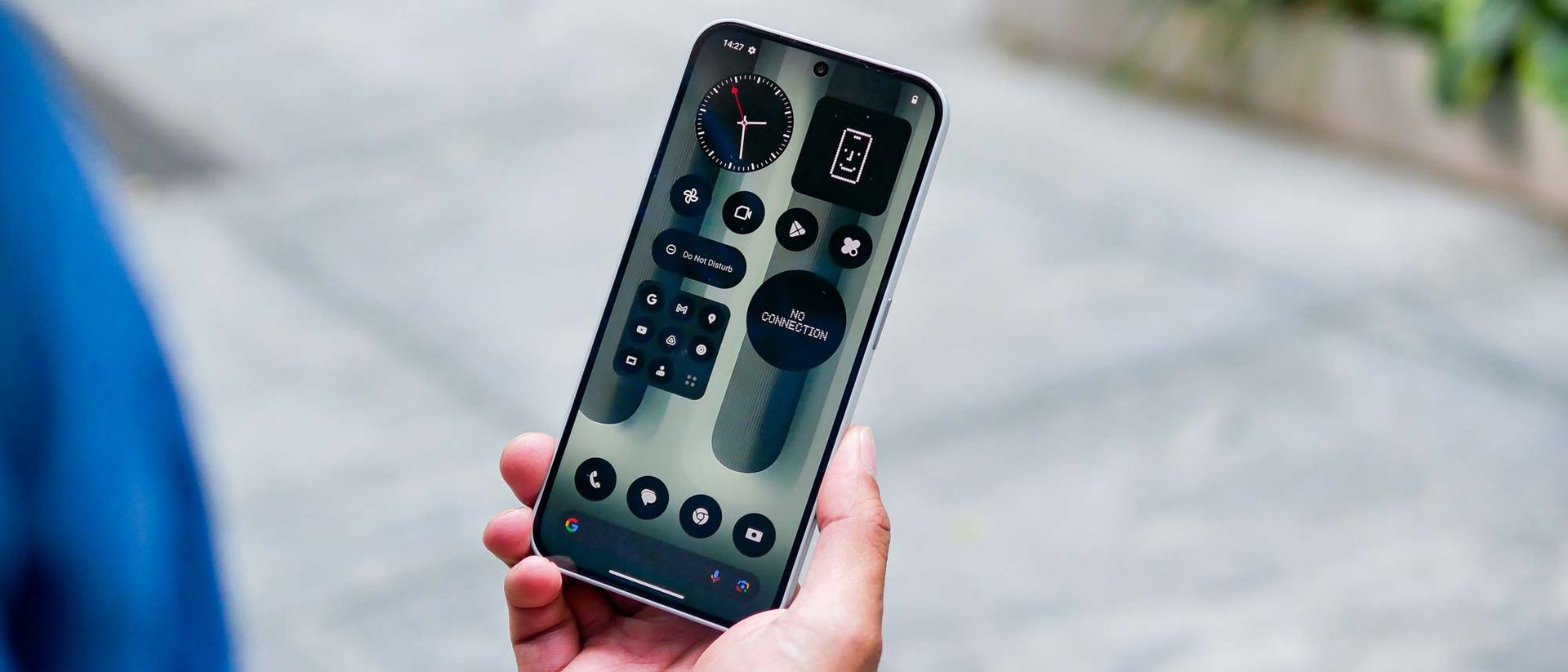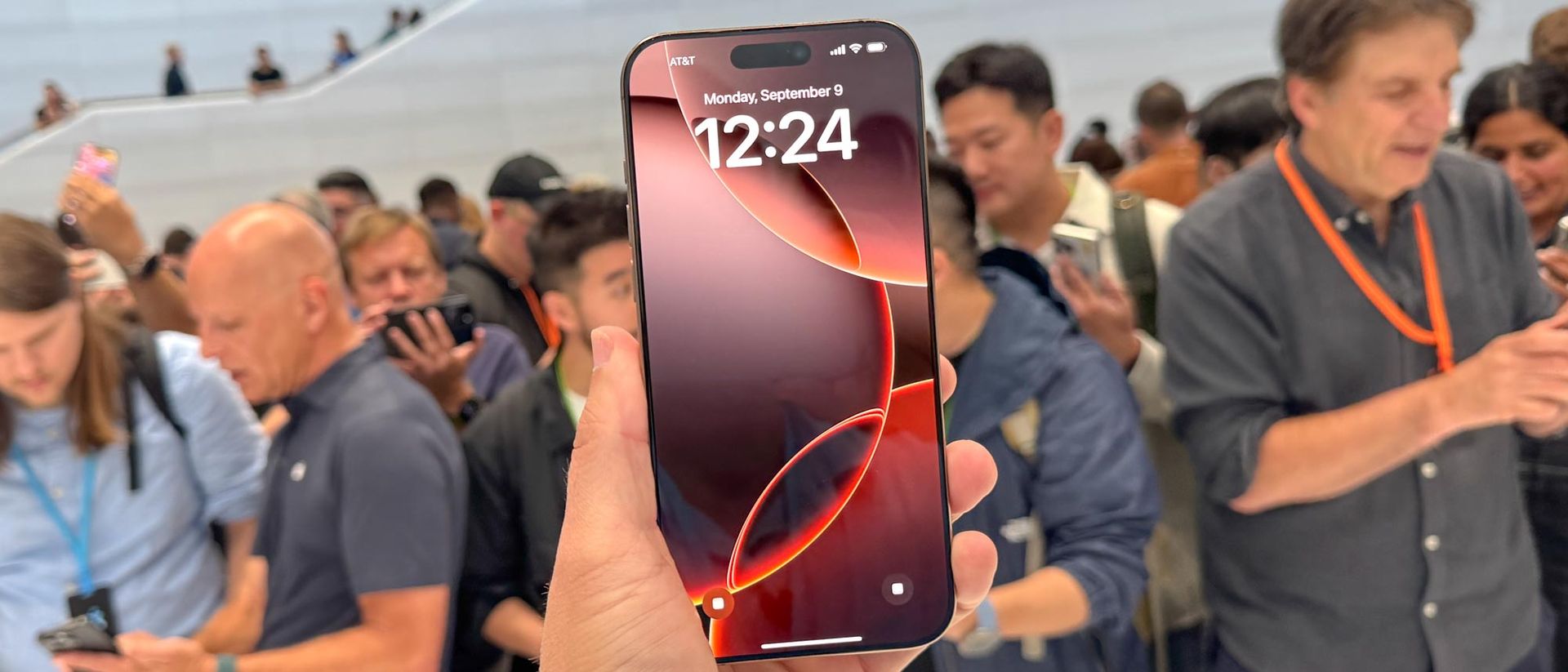Trade in Samsung Galaxy S22 Plus
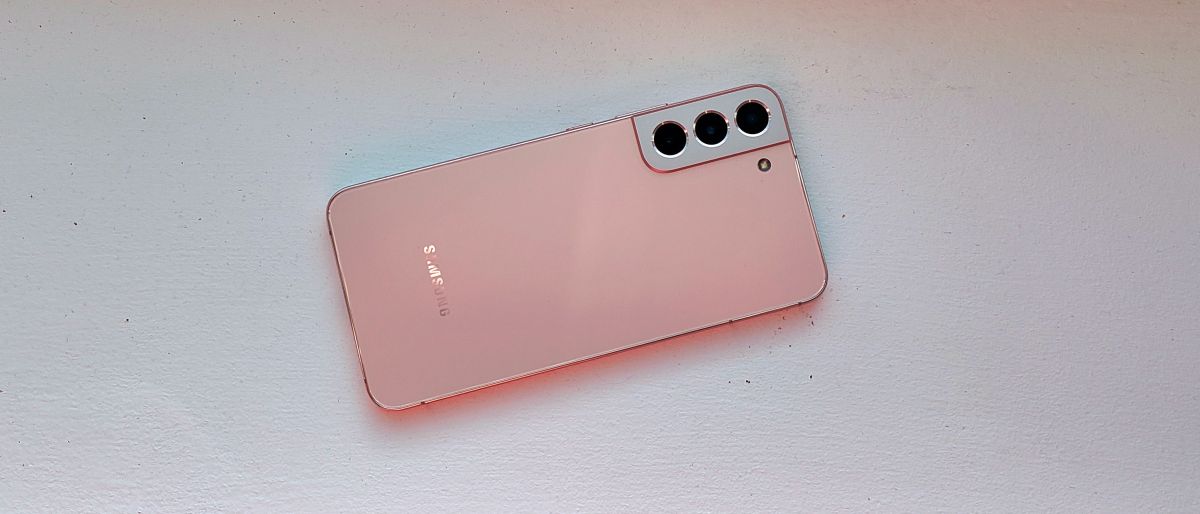
(Image credit: Future)
Two-minute review
Of the three members of Samsung’s 2022 flagship line, the Galaxy S22 Plus feels like the one that most people will forget about.
The Samsung Galaxy S22 is the one that’s easy to recommend: it’s small enough to fit comfortably in your hand, and has a low price that won’t immediately alienate buyers. And then there’s the S22 Ultra with its high price but its S Pen stylus, premium design and plentiful rear cameras which will interest those looking for a super-powerful handset.
Between those two phones, it’s harder to get excited for the Galaxy S22 Plus, the awkward middle child in Samsung’s 2022 family. It mostly has the same specs as the S22, and a similar design, but with a bigger screen and battery. Oh, and its price is a significant step up, too.
Like Samsung’s other S22 mobiles, the Galaxy S22 Plus remains one of the best phones in many different fields, but its high price and lack of upgrades over the S21 Plus make it look less appealing given the competitive actions of most rivals. Compared to the Xiaomi 12 Pro, OnePlus 10 Pro or Realme GT 2 Pro, or even affordable and capable alternatives like the Moto G200, Realme GT and OnePlus Nord 2, this is a really tough sell.
There are certainly some points in its favor. The Galaxy S22 Plus is great for taking portrait shots, and the camera app’s Portrait mode is fantastic both at the artificial background blur and for the range of effects and filters you can utilize. The camera app is great, and Single Take (which basically picks the best picture from a burst) remains a huge selling point for the company’s phones.
We also have to commend Samsung for being one of the few phone companies putting out vibrantly colored phones – we tested a pink S22 Plus, and other options include green, blue and violet. How many companies are putting out pink phones these days?
And in many other areas, this is a powerful phone, with a top-end chipset, decent battery life and great main camera.
But it’s not a perfect phone, and we have quite a few gripes, too. With a flat edge, it’s not particularly comfortable to hold, and OneUI remains a sluggish-feeling software that’s slightly slower than other Android forks to use. Its display quality, charging speeds, and build quality are all decidedly average, too.
We are Tradelectronics, licensed second-hand electronics dealer located in Sydney CBD, experts in trading used laptops, old cameras & lens, and used mobile phones. Fast, Reliable & We Pay More! Get a free quote on your favourite WhatsApp, Facebook, SMS & Email, instant reply!
| Click icon for WhatsApp Quote | Click icon for facebook Quote |
 |
 |
- We are open from Mon – Sat 12pm – 7pm
- Get your free quote from WhatsApp and Messenger are highly recommended, we can guide you through in finding the accurate specs for your laptops, cameras & lens, mobile phones as well. As such we can provide a more precise quote for you.
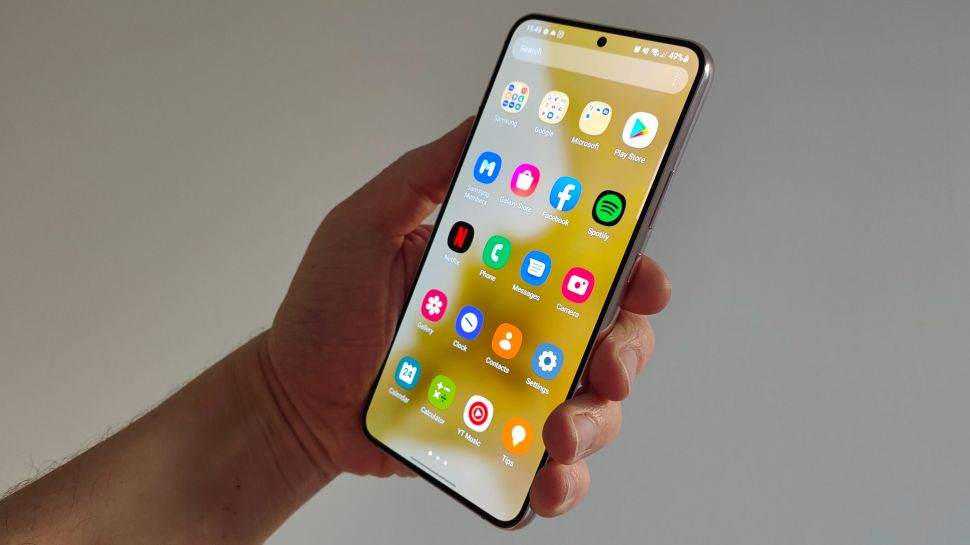
(Image credit: Future)
Plus, it’s exceedingly expensive – we shouldn’t be calling a phone that costs this much ‘average’ in any way, and the overall use experience of this mobile is more comparable to mid-rangers than similarly priced Android or iPhone rivals you might be considering instead.
With a few discounts this phone might prove popular, but at its price it’s hard to recommend.
Samsung Galaxy S22 Plus price and availability
The Samsung Galaxy S22 Plus price starts at $999.99 / £949 / AU$1,549 – and if you winced at that, you’re not going to like the prices for its other variants, which you can find listed below.
| RAM / Storage | US price | UK price | AU price |
| 8/128GB | $999 | £949 | $1,549 |
| 8/256GB | $1,049 | £999 | $1,649 |
For context, the standard Galaxy S22 starts at $799 / £769 / AU$1,249 while the lowest price for the S22 Ultra is $1,199.99 / £1,149 / AU$1,849. Last year’s S21 Plus cost exactly the same as the S22 Plus, so at least we’re not looking at a more expensive phone, even though the size decrease from last year made us hope for a lower price to match.
Either way, that’s a supremely expensive smartphone – but then again, Samsung’s S-series devices aren’t designed for people on a budget.
The Galaxy S22 Plus went on sale February 25 in the US, March 3 in Australia and March 11 in the UK.
Design
We both love and hate the way the Samsung Galaxy S22 Plus’ design.
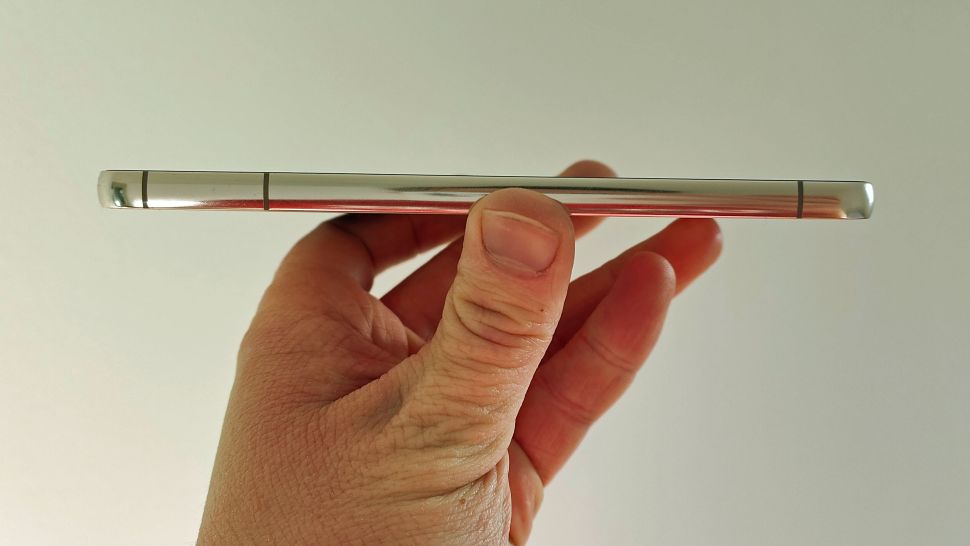
(Image credit: Future)
We love the way it looks. The phone comes in white, black, green, pink, gray, cream, pale blue, and violet (the latter four are only available via Samsung’s website), so you have loads of choices in the shade with some great options. The Contour Cut camera bump is fairly distinct and chic, as far as smartphone lens mounts go at least, but it certainly makes the phone look distinct.
The hate factor becomes apparent when you pick up the phone though, as it just doesn’t feel comfortable. This is partly because of its palm-stretching size, but also thanks to its angular edge. It’s not quite as sharp as the iPhone 13’s totally flat edge, due to its slight curve, but it still digs into your hand when you’re using the device.
Beyond that, this is your standard Android phone. There’s a USB-C slot but no 3.5mm headphone jack, and both the power button and volume rocker are on the right edge (and are fairly easily reachable even when using the device one-handed).
The S22 Plus is a little on the big side, with dimensions of 157.4 x 75.8 x 7.6mm, but the ‘Plus’ in the name should mean that’s no surprise. It weighs 195g, so it’s not overwhelmingly heavy.
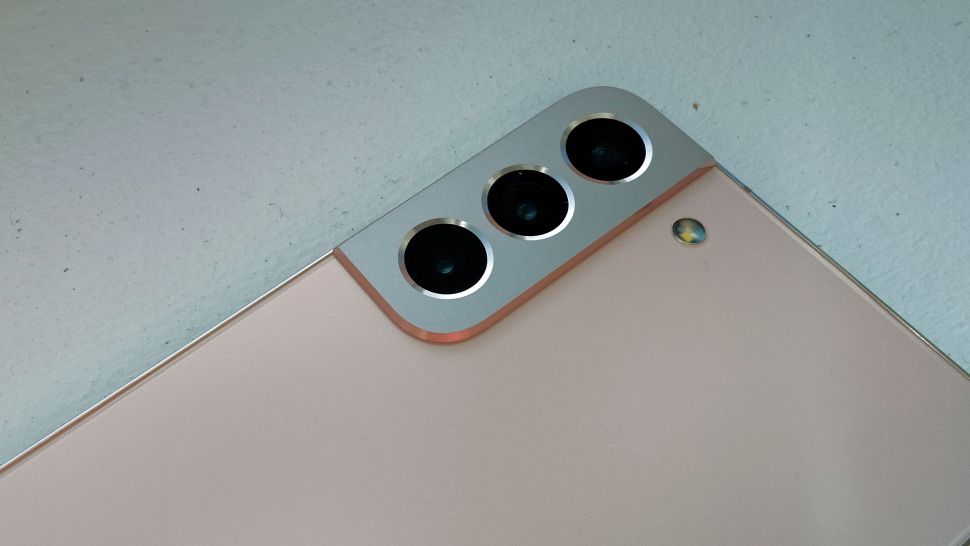
(Image credit: Future)
One difference between this and the S21 Plus is the material – while that device was clad in plastic, this newer one uses glass, in particular Corning Gorilla Glass Victus Plus which is a hardy version of the material. This means it’s scratchproof and won’t disintegrate after a single drop. There’s also IP68 protection against dust and water submersion, so the device will survive a quick drop in the tub.
Display
Samsung’s Galaxy S devices used to be industry-leading for its amazing-looking displays. While the S22 Ultra gets to keep this title, we’re not sure the S22 Plus deserves it. That’s not to say the display is bad looking, but it doesn’t stand out from the crowd.
The screen is 6.6 inches across – that’s 0.1 inches smaller than the S21 Plus’ – broken up by a fairly small punch-hole cut-out for the front-facing camera. The bezel around the display is pretty small.
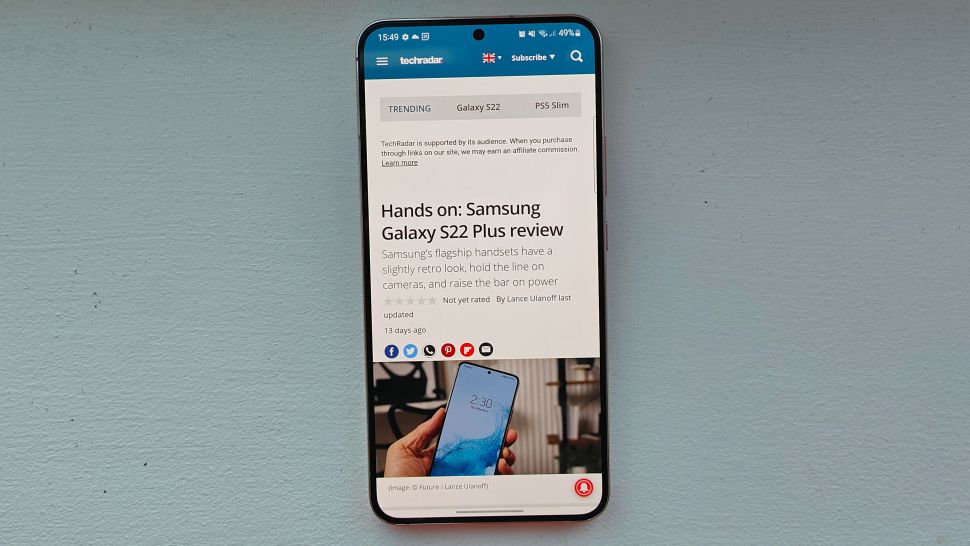
(Image credit: Future)
With a resolution of 1080 x 2340 (or FHD+), the S22 Plus has the same resolution as most other Android phones save for super-cheap or super-pricey phones, and thanks to its cost, we would have thought the Plus falls into that latter category. The Ultra has a screen with a 1440 x 3088 resolution, and we would have liked to see something similar here.
FHD+ is fine for most tasks though, as only select streaming services or games offer content that’s a higher resolution than that anyway. There’s also a refresh rate of 120Hz, which means motion looks pretty smooth when you’re swiping between menus or playing games.
While the resolution is pretty average, the S22 Plus wins some points in other display areas. Its max brightness is very high at 1,750 nits, and thanks to the AMOLED screen, contrast is impressive.
Cameras
The Samsung Galaxy S22 Plus has the same four cameras as its non-Plus counterpart: that’s a 50MP f/1.8 main, 12MP f/2.2 ultrawide and 10MP f/2.4 telephoto for 3x optical zoom on the back, and a 10MP f/2.2 front-facing camera on the other side.
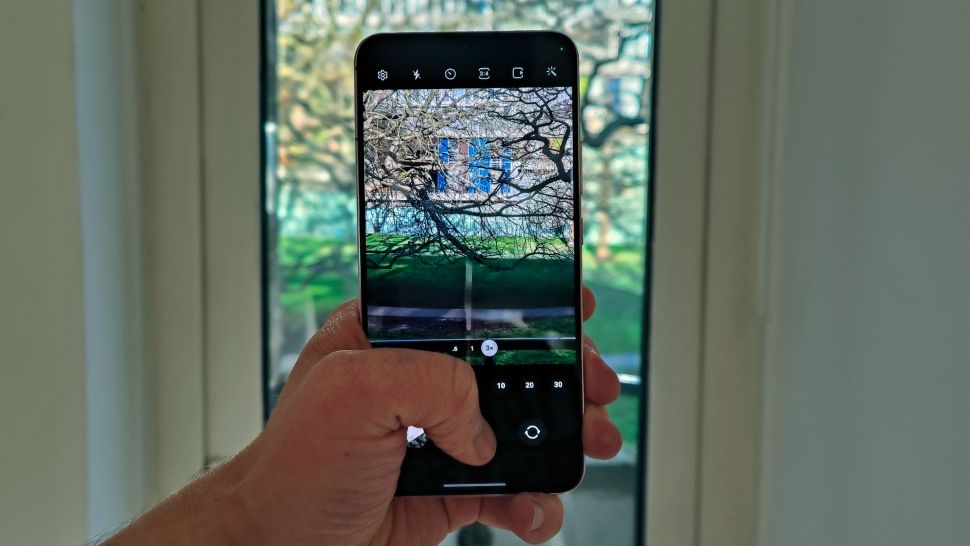
(Image credit: Future)
That camera combination is somewhat of a remix of the S21’s sensors, with only the ultra-wide and front-facers the same, and the most notable difference is the jump from a 12MP to 50MP main camera.
This upgrade is welcome as the 50MP sensor is a large one, so it ‘sees’ more light, resulting in brighter images and more vibrant colors. This is most noteworthy for low-light photography, as we managed to capture some surprisingly bright-looking snaps at nighttime, but also helps during the day to make colors stand out more.
The S22 Plus doesn’t quite have the camera versatility of its Ultra sibling, most notably with a greatly reduced zoom distance – max digital zoom is just 30x here. Still, some of its great features are here too, particularly Samsung’s fantastic Portrait mode which is second to none at isolating a subject, adding great-looking ‘Bokeh’ background blur, and letting you add a range of effects to the snap.
The rear trio works well together – jumping between ultra-wide, standard photos and zoom in the camera app is seamless, and pictures taken retain the same color profile, too. Ultra-wide pictures were a touch distorted, but not much – we had to specifically look for this to find it.
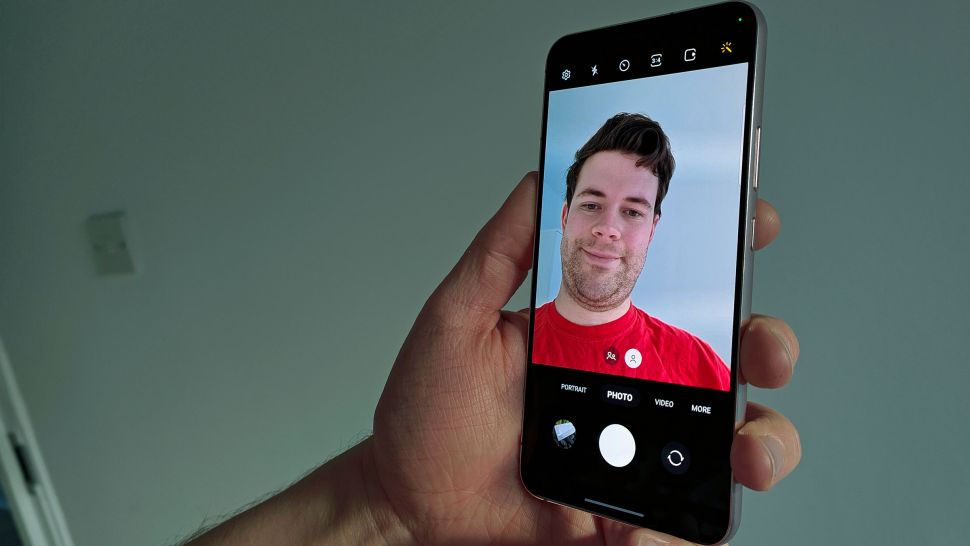
(Image credit: Future)
The front-facing camera might sound iffy at just 10MP, but in practice images looked great, with vibrant colors and clear features. That was particularly true of Portrait mode on this camera, which was fantastic at balancing exposure – no overly bright background was going to ruin this selfie, no chance!
Video recording goes up to 8K, which we’ve no idea why any average user would use. There’s also 4K recording at up to 60fps, and using a sub-8K-resolution also lets you use image smoothing and stabilization.
Some useful modes are present here, including Samsung’s Single Take which lets you record a video of a subject, and the camera app will pick out the best still shot from it and will edit it for you. This is a great way of letting AI do all the heavy lifting when you’re taking a snap.
Camera samples
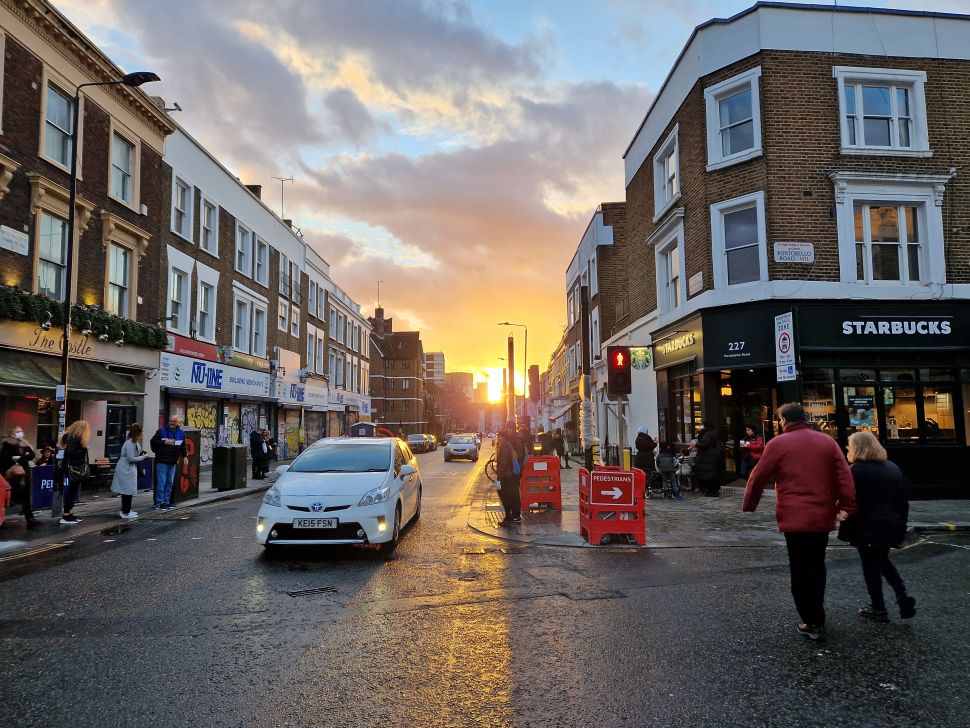
(Image credit: Future)
Performance and specs
When it comes to performance, the Samsung Galaxy S22 Plus has two identities: in most of the world, it packs Qualcomm’s Snapdragon 8 Gen 1 chipset, while in Europe it uses Samsung’s Exynos 2200. Both are roughly equal in terms of performance, though Qualcomm’s processor generally has a slight edge over Samsung’s.
For our full review, we used the Exynos-powered phone, and it ran well. When we put the device through a multi-core benchmark test using Geekbench 5, it returned a score of 3,431. That’s a very high score, and one of the highest we’ve seen from a Samsung phone too, but a few 2021 devices beat it, including the Xiaomi Mi 11, Realme GT, OnePlus 9, and ZTE Axon 30 Ultra. Those devices all use the Snapdragon 888, the predecessor to the 8 Gen 1, which points towards the Exynos chip being a tiny bit weaker.
We’re only talking about a couple of hundred points in the test though, and in practice, most people won’t notice that kind of difference. The phone is great for gaming as it loads titles quickly, doesn’t stutter during sessions, and lets you load up the top-graphics settings for games.
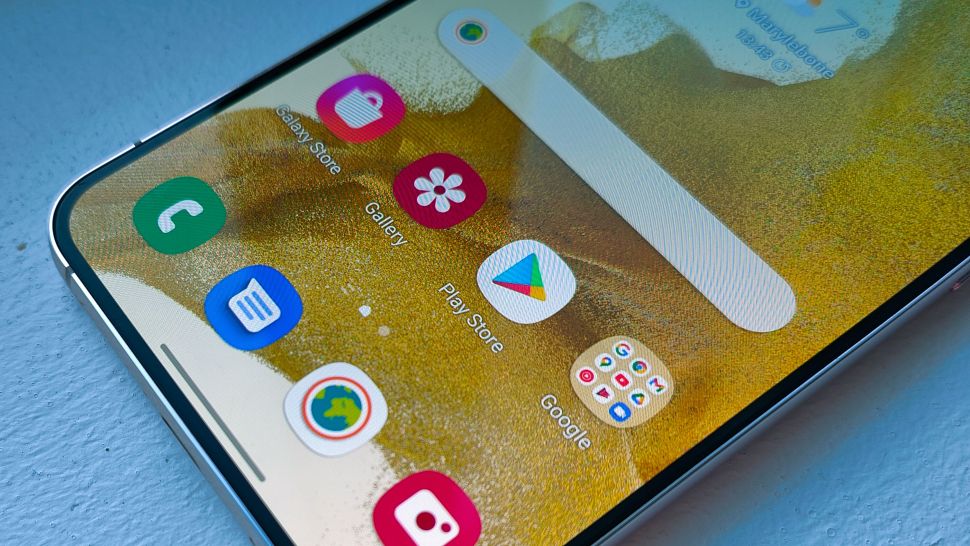
(Image credit: Future)
There’s 8GB RAM here which is just about as much as any smartphone needs, and it’ll be useful for people who like jumping between different apps all the time. Storage comes in at 128GB or 256GB, but there’s no expandable storage, so you better be happy with whichever option you pick (or just use cloud storage).
Both chipsets are paired with 5G modems, so both of these phones let you connect to next-gen networks which is useful for streaming and gaming on the go.
We found the audio quality a tiny bit tinny when the phone was on higher volumes, but it was fit for something like gaming or taking video calls.
Software
The Samsung Galaxy S22 Plus comes with Android 12, with Samsung’s One UI laid over the top. At the S22 launch, Samsung pledged that its new phones would get at least four years of software updates, which will take you to Android 16 in 2026.
Android 12’s big feature is Material You, which lets you recolor aspects of the user interface to match your wallpaper, and that’s also here, to an extent, though it doesn’t affect too many aspects of the home screen and menus.
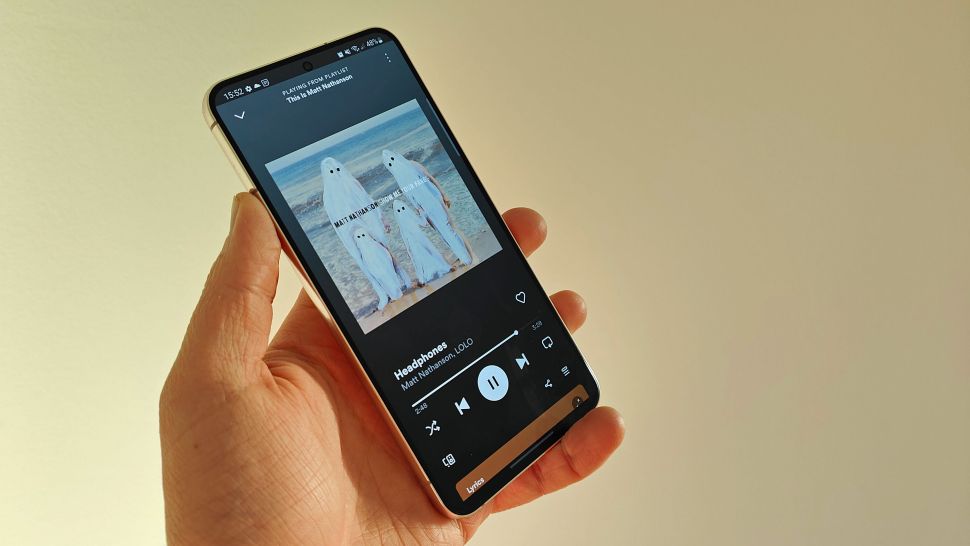
(Image credit: Future)
One UI feels a little bit slower than lots of rival user interfaces like Xiaomi’s MIUI, OnePlus’ OxygenOS or even stock Android. The different animations for swiping between menus, opening apps and unlocking the phone all take a little longer than we’d like, and together these factors make navigating the phone feel sluggish.
Don’t get us wrong: using the S22 Plus isn’t the same as using a cheap phone. But it doesn’t quite feel like a flagship in terms of navigation either. This is something we’ve found with previous Samsung phones and it’s the case here, too.
Battery life
Many Samsung Galaxy S22 Plus reports criticized the phone’s battery life, but we can’t go that far. From our time testing the phone, the 4,500mAh battery saw the phone through a day of use just fine. Sure, the mobile didn’t last long into a second day, but most premium phones don’t.
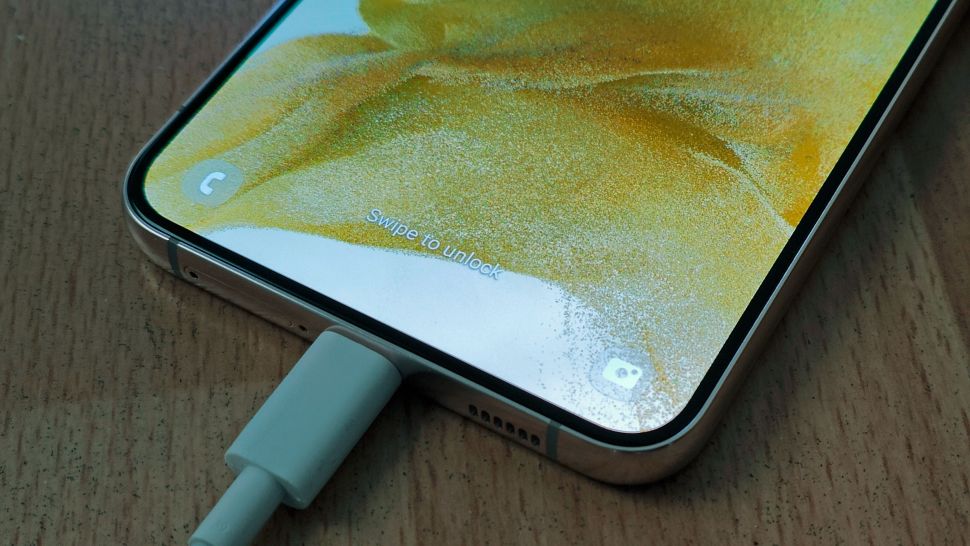
(Image credit: Future)
Obviously intensive tasks like gaming, streaming lots of media or recording high-res footage will drain the battery quickly, but even with bouts of all three we found the phone lasted a day just fine. It certainly had more lasting power than the S22 Ultra, which we tested separately.
If there’s something that does make us narrow our eyes in doubt, it’s the charging speed. Samsung claims that the phone charges at 45W, a figure that’s hard for average users to test given that the phone doesn’t come with an in-box charger. But when we used an 80W charger on the phone, it still took over two hours to power from empty to full.
That’s not 45W charging, and we’re not the only reviewers who’ve found issueswith Samsung’s claims of 45W charging. It seems that the powering speed is closer to 20W, which really isn’t good for a phone that costs this much.
There’s also reverse wireless powering at 15W and reverse power-sharing at 4.5W (which lets you power up other devices using the Plus as a wireless charging pad).
Should I buy the Samsung Galaxy S22 Plus?
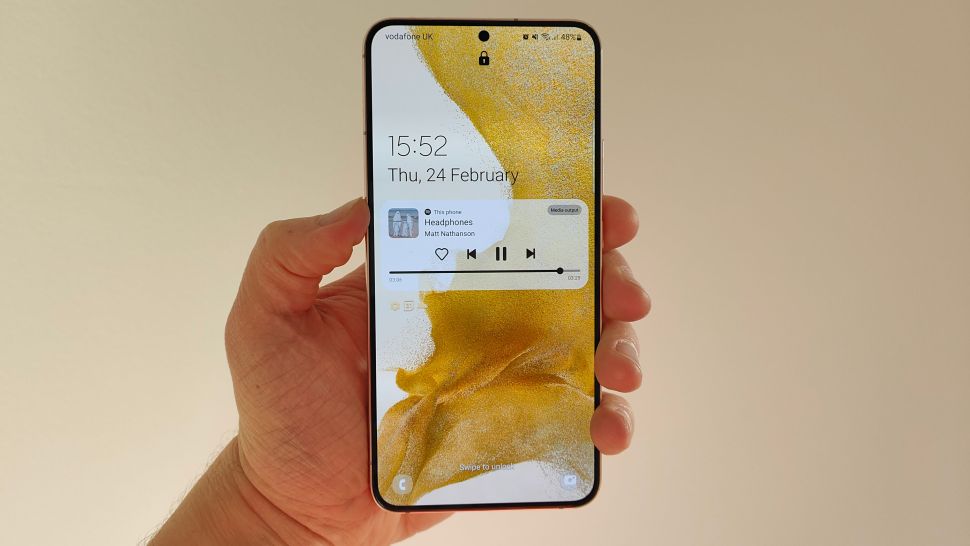
(Image credit: Future)
Buy it if…
Don’t buy it if…
Source: Techradar

